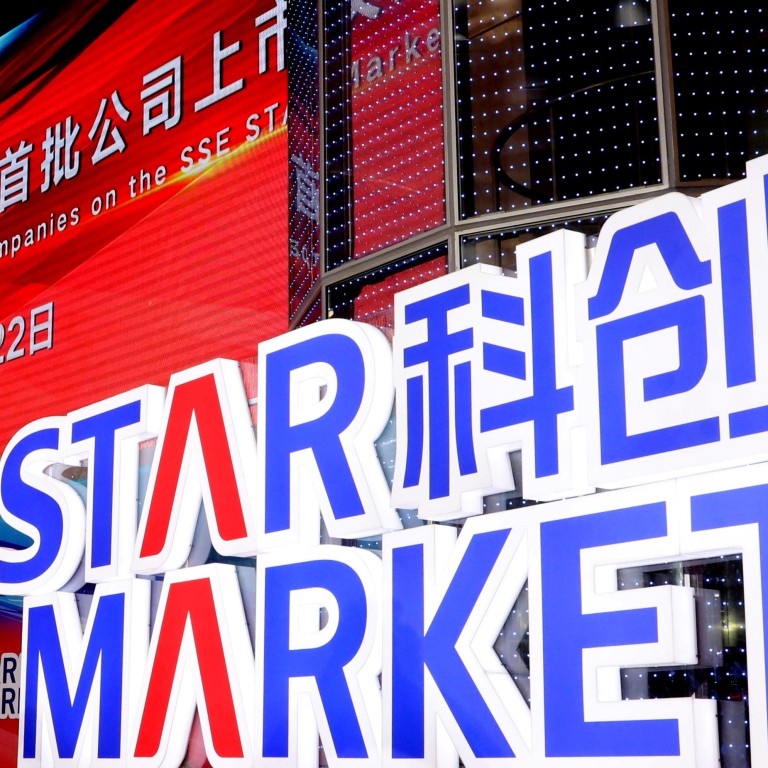
China’s priciest IPO of the year makes solid trading debut after listing rules overhaul
- Shanghai Suochen sold shares in an IPO at 245.56 yuan apiece, which was 369 times its historical earnings, dwarfing the industry’s average multiple of 58
- China’s priciest IPO of the year surged as investors validated a sweeping overhaul of listings rules that removed an administrative pricing cap
Shanghai Suochen Information Technology, China’s priciest initial public offering (IPO) of the year, surged on debut as investors validated the recent sweeping overhaul of listings rules that removed an administrative pricing cap.
Shares of the computer aided engineering (CAE) software developer jumped by as much as 21 per cent to 297 yuan on the Shanghai exchange’s technology-board Star Market on Tuesday, before cooling to 252 yuan at the close, with 65 per cent of the new shares changing hands on the day. The current price valued Shanghai Suochen at 10.4 billion yuan (US$1.5 billion), compared with the average capitalisation of 14 billion yuan for the Star Market.
Shanghai Suochen’s IPO sold shares at 245.56 yuan apiece, which was 369 times its historical earnings, dwarfing the industry’s average multiple of 58, according to data provider Eastmoney.com. The offer price is also the highest among all the 94 offerings made on mainland China’s exchanges in 2023.

The revamps include scrapping the cap on IPO pricing, which had been set at 23 times historical earnings to avoid flops, allowing new shares to rise or fall without exchange-set daily limits in the initial days of trading, and lowering the profit requirements to focus on the quality of information disclosed.
Investors also welcomed Shanghai Souchen’s listing, taking the view that China’s technological self-reliance drive will boost demand for the company’s CAE software products, most of which are supplied to the nation’s defence compaines. China relies on imports for 95 per cent of CAE software, and the 10 biggest suppliers in the domestic market, like ANSYS of the US and Dassault Systemes of France, are overseas companies, according to Huajin Securities and the company’s sales prospectus.
“In recent years, lots of domestic research institutes have been banned from access to industrial software,” said Li Hui, an analyst at Huajin Securities. “That highlights the growing importance of the key home-grown product in the industrial software field. The process of domestic replacement is expected to accelerate.”
Regulator to cease reviewing China IPOs, letting market set share prices
CAE is the use of computer software to simulate performance to improve product designs or assist in the resolution of engineering problems for a wide range of industries, from aerospace to weapons to medical equipment. It can simulate, validate and optimise products, processes and manufacturing tools.
Shanghai Suochen’s top clients are China’s state-backed military companies, including Aero Engine Corp of China and China State Shipbuilding Corp. Many of these names are on the US’s sanction list for alleged human rights violations, which prevents them from accessing international technology.
Aero Engine and its affiliates accounted for 27 per cent of Shanghai Suochen’s revenue in 2021, and China State Shipbuilding and its units made up 14 per cent of its annual sales, according to the prospectus.
In break from past, ByteDance buy-back price for staff shareholders sees no rise
The Shanghai-based company estimates it posted a net loss of as much as 19 million yuan in the first quarter, citing seasonality and an increase in the number of employees, according to its prospectus. Net income rose 6.8 per cent from a year earlier to 53.8 million yuan in 2022.
Shanghai Suochen raised 2.5 billion yuan selling 10.3 million IPO shares, more than twice its fundraising goal of 968 million yuan indicated in the issue prospectus. The proceeds will be used to fund construction of research and development centres, build sales networks and replenish working capital, according to the document.
That makes Shanghai Suochen the 10th largest IPO on China’s onshore stock market this year, according to Bloomberg data. The biggest offering was power generator Shaanxi Energy Investment, which raked in 7.2 billion yuan earlier this month.
Some 94 companies have raised a combined US$16 billion from IPOs on the mainland’s three exchanges in 2023, while the Hong Kong bourse has seen 17 deals that have raked in a total of US$866 million, the data shows.

